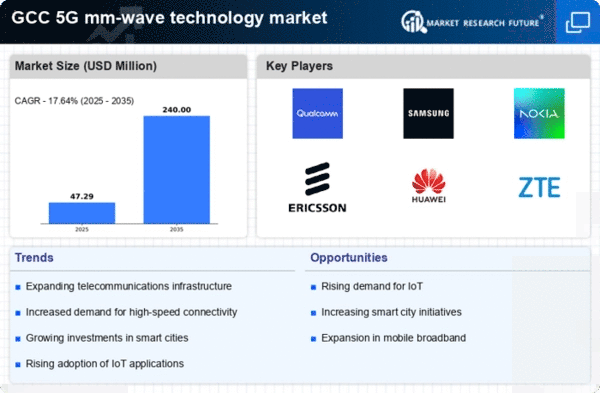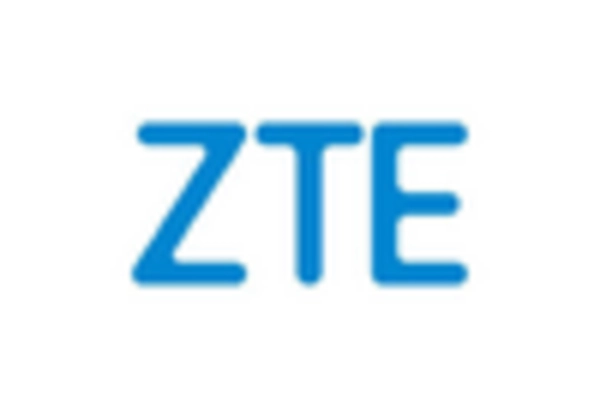Expansion of IoT Ecosystem
The expansion of the Internet of Things (IoT) ecosystem is a significant driver for the 5G mm-wave technology market. In the GCC, the proliferation of connected devices is expected to surge, with estimates suggesting that the number of IoT devices could reach 30 billion globally by 2030. This growth necessitates the deployment of high-capacity networks capable of handling vast amounts of data traffic, which mm-wave technology is well-suited to provide. The ability to support a large number of simultaneous connections with low latency makes 5g mm-wave technology essential for IoT applications, including smart homes, industrial automation, and healthcare solutions. As businesses and governments invest in IoT infrastructure, the demand for 5g mm-wave technology is likely to increase, thereby propelling the market forward.
Rising Adoption of Smart Cities
The concept of smart cities is gaining traction in the GCC, significantly impacting the 5G mm-wave technology market. As urban areas evolve, the integration of smart technologies necessitates high-speed connectivity, which mm-wave technology can provide. The implementation of smart infrastructure, such as intelligent traffic management systems and smart energy grids, relies heavily on the capabilities of 5g mm-wave networks. Reports indicate that investments in smart city projects in the GCC could exceed $20 billion by 2030, creating a substantial market opportunity for 5g mm-wave technology providers. This trend suggests that as cities become smarter, the demand for advanced telecommunications solutions will continue to rise, further driving the growth of the 5g mm-wave-technology market.
Government Initiatives and Investments
Government initiatives play a pivotal role in shaping the 5G mm-wave technology market. In the GCC, various governments are actively promoting the adoption of advanced telecommunications technologies through strategic investments and policy frameworks. For instance, initiatives aimed at enhancing digital infrastructure are expected to allocate over $5 billion towards 5g development by 2027. These investments are designed to foster innovation and attract foreign direct investment, which is likely to stimulate growth in the 5g mm-wave-technology market. Additionally, regulatory bodies are working to streamline the licensing process for mm-wave spectrum, which could further accelerate deployment and adoption across the region.
Increased Demand for High-Speed Internet
The demand for high-speed internet services is a primary driver of the 5G mm-wave technology market. As consumers and businesses in the GCC region seek faster and more reliable internet connections, the need for mm-wave technology becomes more pronounced. This technology offers significantly higher data rates, potentially exceeding 10 Gbps, which is essential for applications such as cloud computing and IoT devices. Market analysis suggests that the number of connected devices in the GCC could reach 50 million by 2025, further fueling the need for robust 5g mm-wave infrastructure. Consequently, telecommunications providers are investing heavily in expanding their mm-wave networks to meet this growing demand, thereby propelling the 5g mm-wave-technology market forward.
Technological Advancements in Telecommunications
The 5G mm-wave technology market is experiencing rapid technological advancements, particularly in telecommunications infrastructure. Innovations in antenna design and signal processing are enhancing the efficiency and capacity of mm-wave networks. As a result, the deployment of 5g mm-wave technology is becoming more feasible, with projections indicating that the market could reach a valuation of approximately $10 billion by 2026 in the GCC region. These advancements are crucial for supporting high-bandwidth applications such as augmented reality and ultra-high-definition video streaming, which are increasingly demanded by consumers and businesses alike. Furthermore, the integration of artificial intelligence in network management is expected to optimize performance and reduce operational costs, thereby driving growth in the 5g mm-wave-technology market.
















